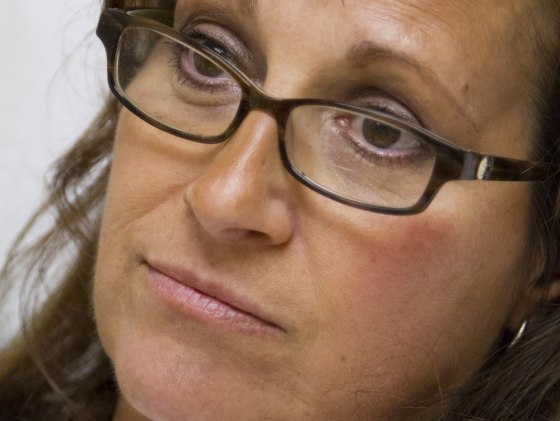A year after a deadly fungal meningitis outbreak tied to tainted pain shots, victims like Margaret Snopkowski say they remain devastated by the ordeal — but determined to rebuild their lives.
“I go to work every day, I do my job, my numbers are up,” said Snopkowski, 52, who is a sales person for an engineered cements company in Fowlerville, Mich. “But I literally have to allow myself two hours to get a handle on the pain.”
Snopkowski, whose doctor says she was among the “sickest of the sick,” was hospitalized for months with meningitis, had surgery to remove large abscesses from her spinal column last spring and suffers from an inoperable infection at the base of her spine, one that still requires weekly infusions of a powerful antifungal drug.
Other victims like cousins John Nedroscik, 62, and Dirk Thompson, 58, both of Howell, Mich., said they’re gradually getting better, but they face lingering mental confusion, drug-related nightmares and the uncertainty of not knowing when — or if — they’ll ever be cured.
“We’re all guinea pigs and the experiment is not yet over with,” said Thompson, who runs a family-owned stained-glass business with Nedrosick.
They’re among some 750 people sickened in the outbreak that started in the late summer of 2012, peaked in the fall and eventually led to 64 deaths. Health officials traced the dangerous fungal infections to contaminated steroid back pain shots manufactured by the now-shuttered New England Compounding Center of Framingham, Mass. Like many patients, Snopkowski took the shots for several years in order to avoid using prescription painkillers.
A year later, the crisis has sent the firm into bankruptcy, spurred state and federal crackdowns on compounding pharmacies that mix drugs to order and sparked pending legislation that could create a new category of compounder subject to stricter oversight by the federal Food and Drug Administration.
FDA officials have issued 19 recalls for products from compounding pharmacies this year alone, typically because supposedly sterile products were contaminated. There are about 7,500 compounding pharmacies in the U.S., including about 3,000 that specialize in sterile products, according to the International Academy of Compounding Pharmacists. Another 8,200 hospitals and other health centers also engage in compounding.
Many of the victims of the original crisis have recovered well enough to resume normal lives, said Dr. Anurag N. Malani, an infectious disease expert at St. Joseph Mercy Hospital Ann Arbor, which saw nearly 200 of the patients treated nationwide.
But for a significant minority — 40 to 45 patients at his hospital alone and more nationwide — the effects of the outbreak have been severe and long-lasting.
“There is a subset of patients where it’s still kind of unknown,” Malani said. “Therapy may be indefinite, lifelong.”
Those are patients who not only suffered from fungal meningitis and underwent surgery, but who also developed severe arachnoiditis, an inflammation of the membranes that surround and protect the nerves of the central nervous system.
Malani includes Margaret Snopkowski in that group. Though she has been able to go back to work and resume family life, including visits with Ethan, the grandson whose birth she missed during her hospitalization last year, it has been difficult.
“This has turned my life upside down,” she said. “This illness and what has happened to me has robbed me of everything that makes me happy. Gardening, cooking, I like to clean my own house. I don’t do any of that now.”
Snopkowski and other victims say they’re not sure that they’ll receive any help for their injuries. Nearly 620 victims have sued or filed legal claims against NECC, with more expected before a January deadline. But David Rashid, a lawyer for the Chicago firm representing Snopkowski and four other victims, says they’ve tried to lower expectations.
“It’s going to be dimes on the dollar,” he said. “There is no money that could give Margaret at 52 the normal life she had back. There is no money that could give victims back their loved ones.”
Victims say they’re also not certain whether new oversight or regulation will actually ensure that such contamination won’t happen again.
“I have talked to people and a lot of them still don’t even know that it’s a problem,” Snopkowski said.
Some analysts are more optimistic. Allan Coukell, who oversees medical programs for the Pew Charitable Trusts, said that the proposed legislation, known as the Drug Quality and Security Act, would allow large compounders to register voluntarily as manufacturers or “outsourcing facilities” subject to FDA regulation.
The IACP, the industry trade group, says that the bill, which has passed the House and is expected to head soon to the Senate, doesn’t provide clear enough definitions and “would not prevent another NECC-like tragedy.”
But, Coukell said, for victims like Snopkowski and others, the new attention and, possibly, the new law, could provide some comfort.
“The landscape changes slowly, but the combination of FDA stepping up oversight, combined with a new category of facility that meets a higher standard, will put us on the path to reducing those kinds of safety problems.”
JoNel Aleccia is a senior health reporter with NBC News. Reach her on Twitter at @JoNel_Aleccia or send her an email.
